外研版必修1Module 5 A Lesson in a Lab课件 (45张ppt)
文档属性
| 名称 | 外研版必修1Module 5 A Lesson in a Lab课件 (45张ppt) |  | |
| 格式 | zip | ||
| 文件大小 | 3.8MB | ||
| 资源类型 | 教案 | ||
| 版本资源 | 外研版 | ||
| 科目 | 英语 | ||
| 更新时间 | 2021-11-24 15:41:53 | ||
图片预览


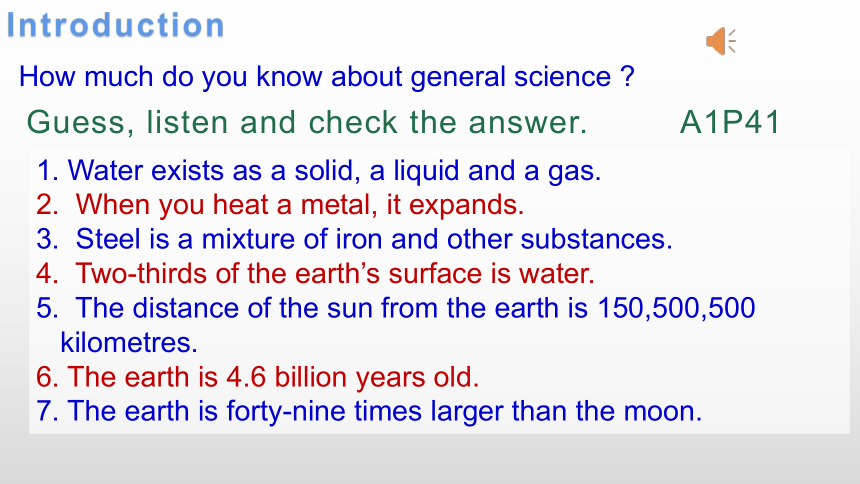
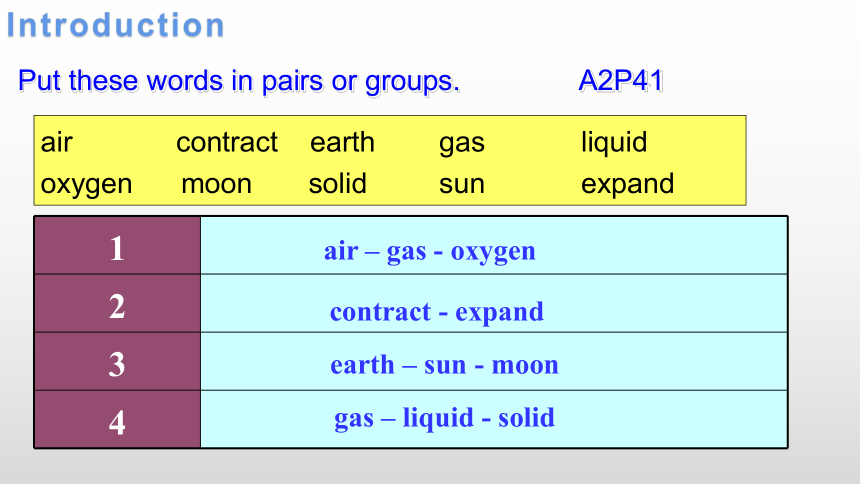

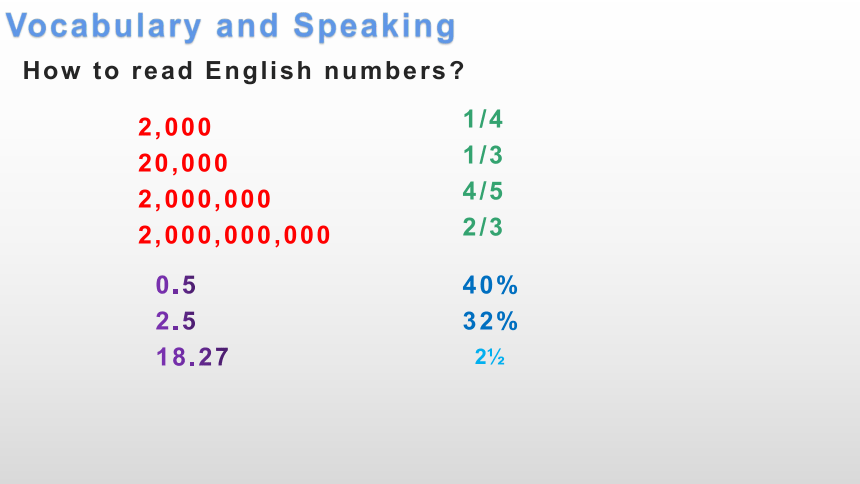
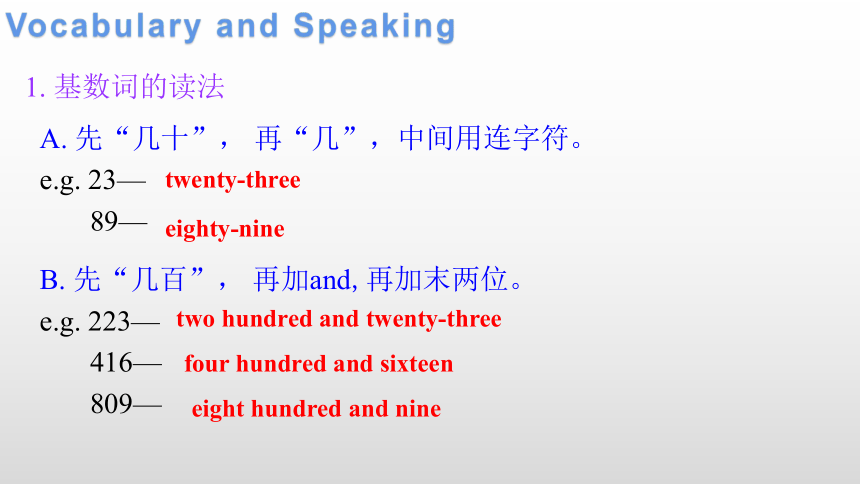
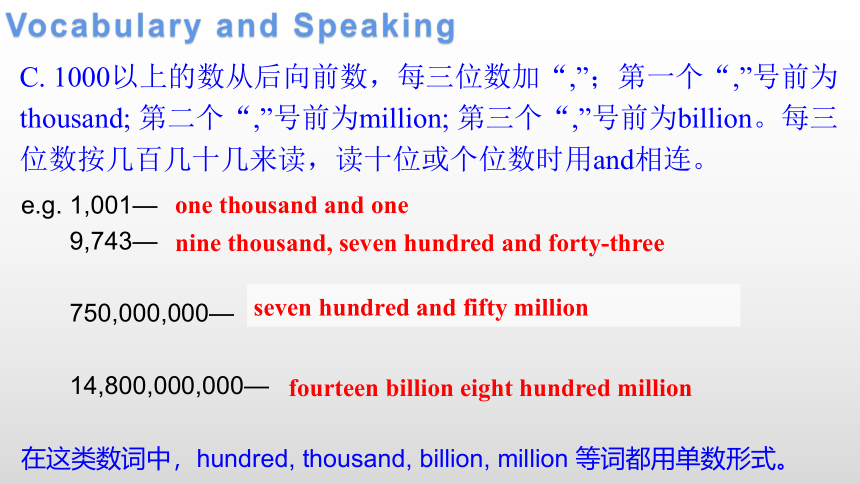

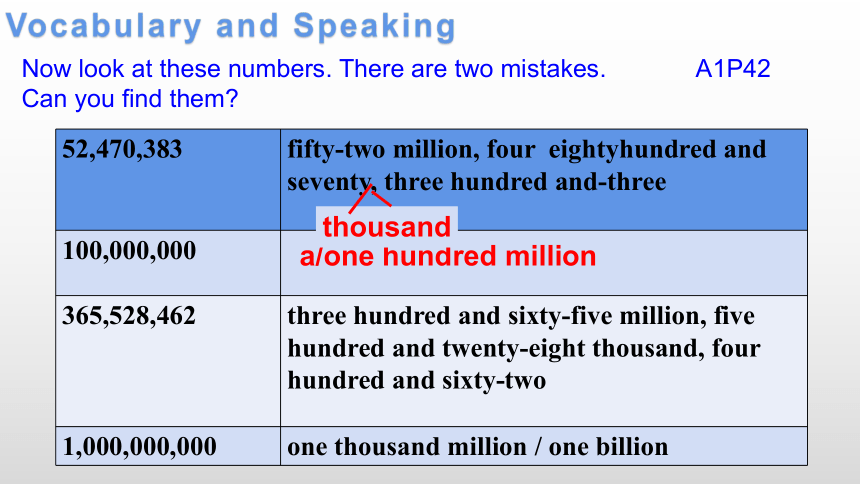
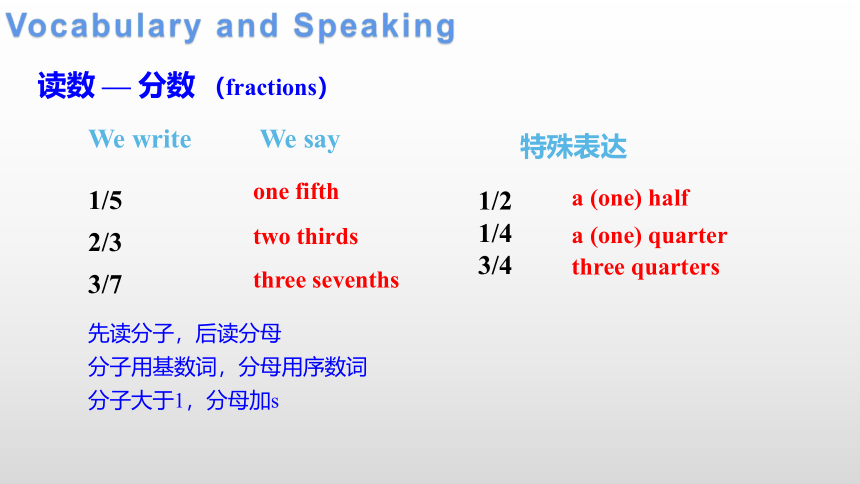
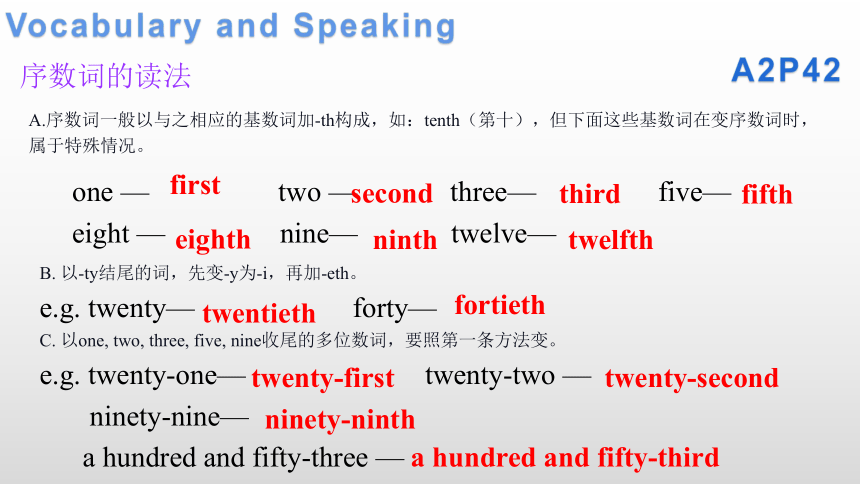
文档简介
(共45张PPT)
A Lesson in a Lab
What words can you think of when you look at these pictures
science
scientific
experiment
Introduction
Introduction
Guess, listen and check the answer. A1P41
How much do you know about general science
1. Water exists as a solid, a liquid and a gas.
2. When you heat a metal, it expands.
3. Steel is a mixture of iron and other substances.
4. Two-thirds of the earth’s surface is water.
5. The distance of the sun from the earth is 150,500,500 kilometres.
6. The earth is 4.6 billion years old.
7. The earth is forty-nine times larger than the moon.
Put these words in pairs or groups. A2P41
1
2
3
4
air – gas - oxygen
contract - expand
earth – sun - moon
gas – liquid - solid
air contract earth gas liquid
oxygen moon solid sun expand
Introduction
natural
man-made
both
electricity iron air some metals
steel glass some metals
electricity some metals
electricity iron metal steel air glass
Introduction
Answer these questions. A3P41
2,000
20,000
2,000,000
2,000,000,000
How to read English numbers
Vocabulary and Speaking
1/4
1/3
4/5
2/3
0.5
2.5
18.27
40%
32%
2
1. 基数词的读法
A. 先“几十”, 再“几”,中间用连字符。
e.g. 23—
89—
B. 先“几百”, 再加and,再加末两位。
e.g. 223—
416—
809—
twenty-three
eighty-nine
two hundred and twenty-three
four hundred and sixteen
eight hundred and nine
Vocabulary and Speaking
C. 1000以上的数从后向前数,每三位数加“,”;第一个“,”号前为thousand; 第二个“,”号前为million; 第三个“,”号前为billion。每三位数按几百几十几来读,读十位或个位数时用and相连。
Vocabulary and Speaking
e.g. 1,001—
9,743—
750,000,000—
14,800,000,000—
在这类数词中,hundred, thousand, billion, million 等词都用单数形式。
one thousand and one
nine thousand, seven hundred and forty-three
seven hundred and fifty million
fourteen billion eight hundred million
1. Look at these numbers. A1P42
We write We say
2,000,000 two million
5,100,000 five million, one hundred thousand
12,269,000 twelve million, two hundred and sixty-nine thousand
Vocabulary and Speaking
Now look at these numbers. There are two mistakes. A1P42
Can you find them
52,470,383 fifty-two million, four eightyhundred and seventy, three hundred and-three
100,000,000 hundred million
365,528,462 three hundred and sixty-five million, five hundred and twenty-eight thousand, four hundred and sixty-two
1,000,000,000 one thousand million / one billion
a/one hundred million
thousand
Vocabulary and Speaking
We write
1/5
2/3
3/7
We say
one fifth
先读分子,后读分母
分子用基数词,分母用序数词
分子大于1,分母加s
two thirds
three sevenths
读数 — 分数 (fractions)
特殊表达
1/2
1/4
3/4
a (one) half
a (one) quarter
three quarters
Vocabulary and Speaking
序数词的读法
A.序数词一般以与之相应的基数词加-th构成,如:tenth(第十),但下面这些基数词在变序数词时, 属于特殊情况。
one — two — three— five—
eight — nine— twelve—
first
second
third
fifth
eighth
ninth
twelfth
Vocabulary and Speaking
B. 以-ty结尾的词,先变-y为-i,再加-eth。
e.g. twenty— forty—
C. 以one, two, three, five, nine收尾的多位数词,要照第一条方法变。
e.g. twenty-one— twenty-two —
ninety-nine—
a hundred and fifty-three —
twentieth
fortieth
twenty-first
twenty-second
ninety-ninth
a hundred and fifty-third
A2P42
数字 + 百分号(%)
百分号读作percent/ per cent (无复数)
We write
We say
27%
6%
0.68%
twenty-seven percent
six percent
zero point six eight percent
读数 — 百分数 (percentages)
Vocabulary
A3P42
We write
We say
0.5
2.5
18.27
zero point five/point five
eighteen point two seven
two point five
小数点前按基数词读,若整数部分为0可读作zero,也可以不读;小数点读作point;小数点后按基数词分别单个读出。小数点后的0通常读字母O的音。
读数 — 小数 (decimals)
Vocabulary
A1P46
Everyday English P48
1. You’ve got it! (同步练习册 P70)
2. Go ahead!
3. It’s your turn.
Words
1.expand vi.膨胀→ __________n.膨胀;扩大
2.mixture n.混合物→__________ v.混合
3.electricity n.电→__________ adj.电的;用电的→__________ adj.与电有关的;电气化的
→__________ adj.电子的
4.conclusion n.结论→__________ vt.下结论
5.aim n.目标;目的→__________ adj.漫无目的的
6.react vi.(化学)反应→__________ n.反应
expansion
mix
electric
electrical
electronic
conclude
aimless
reaction
7.equipment n.设备;装备→____ vt.装备;配备
8.form vi.形成→_________ adj.正式的
9.balance n.天平;平衡→_________ adj.平衡的
10.lecture n.演讲→_________ n.演讲者
11.astonished adj.吃惊的;惊愕的→_________ adj.令人吃惊的→_________ vt.使吃惊→_________ n.吃惊
Words
equip
formal
balanced
lecturer
astonishing
astonish
astonishment
Biology
English
Chemistry
Geography
History
Physics
Chinese
Mathematics
Politics
PE
(Physical Education)
IT
(Information Technology)
Art class
Music class
Cultural Corner P49
Which subject do you prefer to study
Are you always interested in it/them
How did you become interested in it/them
Mark Kendon is a Canadian student at Senior High school.
Cultural Corner P49
Read this passage quickly and find the main idea of each paragraph.
Cultural Corner P49
Fast-reading
Para1.
Para.2
I want to study physics at university and my parents are astonished.
My feelings about science have really changed.
Careful-reading Why has Mark became more interested in science
Reasons Key words
the science teachers
the science facilities
the chemistry teacher
the lecturers
Canada
excellent
very good, with laboratories that has
all the latest equipment
takes them to public science lectures about four times a term which are very interesting
made real discoveries in their area of science
has many first-class scientists, seven of whom have won the Nobel Prize
Cultural Corner P49
phrases and sentences
1. used to enjoy science
2. changed shools
3. the latest equipment
4. takes us to public science lectures
5. In the last twenty years
6. be very proud of
7. be becoming more and more interested in
1.过去我喜欢理科
2.转学了
3.最新设备
4.带我们去听公共科学讲座
5.在过去的20年里
6.感到很骄傲
7.对...越来越感兴趣
Cultural Corner P49
1.The science facilities are very good, with laboratories that have all the latest equipment.
2.Our chemistry teacher, Mr Longford, takes us to public science lectures about four times a term, and these are always very interesting, as the lecturers are people who have made real discoveries in their area of science.
Cultural Corner P49
科研设备很好,并且实验室都配备了最新设备。
我们的化学老师朗福德先生大约每学期带我们去听四次大众科学讲座。这些讲座总是非常有趣,因为演讲者都是在各自的科研领域里真正有所发现的人。
3. I’m going to try to go to either Montreal or Ottawa University, as both are supposed to have good Physics Departments.
4.They always thought I would become an English teacher!
Cultural Corner P49
我打算上蒙特利尔大学或渥太华大学,因为这两所学校的物理系都很好。
他们一直认为我会成为一名英语教师!
屠呦呦
Chinese Nobel Prize Winners
Cultural Corner P49
莫言
屠呦呦
屠呦呦是中国中医研究院终身研究员兼首席研究员,青蒿素研究开发中心主任,博士生导师、药学家,诺贝尔医学奖获得者。屠呦呦是第一位获得诺贝尔科学奖项的中国本土科学家,第一位获得诺贝尔生理医学奖的华人科学家。
屠呦呦多年从事中药和中西药结合研究,突出贡献是创制新型抗疟药青蒿素和双氢青蒿素。1972年成功提取到了一种分子式为C15H22O5的无色结晶体,命名为青蒿素。
2011年9月,因为发现青蒿素——一种用于治疗疟疾的药物,挽救了全球特别是发展中国家的数百万人的生命获得拉斯克奖和葛兰素史克中国研发中心“生命科学杰出成就奖”。
莫言
莫言,原名管谟业,1955年2月17日出生于山东省高密市东北乡文化发展区大栏平安村,中国作家协会副主席,2012年诺贝尔文学奖获得者,亦是第一个获得诺贝尔文学奖的中国籍作家。
莫言在2011年凭借小说《蛙》获得茅盾文学奖。2012年获得诺贝尔文学奖。获奖理由是:通过幻觉现实主义将民间故事,历史与当代社会融合在一起。2013年担任网络文学大学名誉校长。2014年12月,获颁香港中文大学荣誉文学博士学位。
2. ...that have all the latest equipment. (同 P73)
latest adj. 最近的, 最新的 ;最迟的, 最晚的
归纳拓展:
late adv. & adj. 迟 的; 晚 的
lately adv. 近来;最近
later adv. 后 来 ; 较晚地
sooner or later 迟 早 later on 后 来
latter adj. & n. 后者的; 后者
Cultural Corner P49
Language Points
1. I never used to enjoy science, and .... (同 P73)
3..., so we should be very proud of that. (同 P73)
4..., as both are supposed to have good Physics Departments. (同 P73)
5. My parents are astonished. (同 P73)
Cultural Corner P49
1. Have you ever done a scientific experiment
2. Where do you do an experiment
3. What apparatus ( equipment ) do we need for an experiment
Reading and Vocabulary
In a lab = In a laboratory
the apparatus ( equipment ) we need for an experiment
balance
test tube holder
test tube
crucible
Bunsen burner
glass rod
beaker
tongs
Reading and Vocabulary
Read the passage and choose the best title for it. A2P44
A. The Different Uses of Metals
B. The Reaction of Metals
C. The Reaction of Metals with Oxygen
Reading and Vocabulary
Passage A
Read the table. Answer these questions. A3P44
1. Which of the metals in the table reacts the most with oxygen and water
Potassium, calcium and sodium.
2. What happens when you heat calcium in oxygen
It burns to form an oxide.
Reading and Vocabulary
Passage A
3. Which metals react with steam
Magnesium, aluminium and zinc.
4. Does iron have a slow or fast reaction with steam
It has a slow reaction.
5. Does copper react with water
No, it doesn’t.
Have you ever written a scientific experiment report
And what is the correct order to describe a scientific experiment
A1P44
Reading and Vocabulary
Passage B
conclusion aim result method
aim
method
result
conclusion
Read Passage B and fill in the table. P45
Iron in dry air Iron in air-free water Iron in ordinary water
Stage A (starting experiment)
water
water
Stage B (1 week later)
Stage C (Result)
cotton
wool
Iron does
not rust.
Iron does
not rust.
Iron rusts.
nails
water
Reading and Vocabulary
Passage B
Iron ______ in ordinary water.
ordinary water
Conclusion
rusts
Reading and Vocabulary
Passage B
Read the passage B again and Complete the think map.
A Simple Scientific Experiment
Text organization- A report on a simple scientific3. ____________
Aim
4.______________
5.______________
Result
6.______________
Specific steps
Iron in dry air
Iron in 1. _________ water
Iron in 2. _________ water
experiment
Apparatus
Method
Conclusion
air-free
ordinary
Reading and Vocabulary
Passage B
Read a conversation about the metal magnesium burns in air and write an experiment report.
writing
handout P
An Experiment Report
1. Aim:_________________________
2. Apparatus/ Equipment: _________________________
3. Method:
(1)First, _________________________
(2)Next, _________________________ (3)Lastly,_________________________
4. Result: _________________________
5. Conclusion: _________________________
write an experiment report.
An Experiment Report
1. Aim: to find out if there's a change in weight when magnesium burns in air.
2. Apparatus/ Equipment: some magnesium, a Bunsen burner, a balance, a crucible
3. Method: (1)First, put the magnesium in the crucibe.
(2)Next, heat the magnesium.
(3)Lastly,weigh the magnesium again.
4. Result: It weighs a little more than before.
5. Conclusion: There is a change in weight when magnesium burns in air.
Reading and Vocabulary
Language Points
1. Put these words in the correct order to.... (同 P62)
2. conclusion (同 P61)
3. aim (同 P62)
be aimed at 旨在;为了;以......为目的
4. It is hard to think of a world without metals. (同 P64)
5. ..., it is important to know how they react with different...
(同 P61)
6. Here is a table with the metals that react most...
Below is a description of a simple scientific experiment.
Reading and Vocabulary
Language Points
全部倒装句
Here is a table.
Below is a description of a simple scientific experiment.
表语
系动词
主语
表语
系动词
主语
Reading and Vocabulary
Language Points
完全倒装是将谓语动词完全提到主语之前。这类句型主要有以下几种形式:
1.表示时间、地点和动作转移的副词,如here, there, now, then, up, down, in, away, out等置于句首时,且主语是名词,谓语动词是不及物动词,句子需用完全倒装。此时,句子多用一般现在时或一般过去时。
Here comes the bus.
公共汽车来了。
Here he comes.
他来了。
2.当地点状语位于句首时,且主语是名词,谓语动词是不及物动词,为了避免头重脚轻,句子需进行完全倒装。
South of the city lies a big steel factory.
一个大的钢厂谓语这座城市的南部。
3.有时为平衡句子结构或突出、强调,将作表语的介词短语、形容词、副词或分词提到句首,构成“表语+系动词+主语”的完全倒装结构。
Present at the party were Mr. Green and many other guests.
出席晚会的有格林先生,还有许多别的宾客。
Gone are the days when they could do what they liked to the Chinese people.
他们对中国人民为所欲为的日子已经一去不复返了。
Reading and Vocabulary
Language Points
7. in ordinary water. (同 P61)
8. Add some oil to the water. (同 P63)
9. This will keep air out of the water. (同 P63)
keep sb from doing sth 阻止某人做某事
= stop sb (from) doing sth
= prevent sb (from) doing sth
10. form(v) (同 P62)
11. balance (同 P62)
A Lesson in a Lab
What words can you think of when you look at these pictures
science
scientific
experiment
Introduction
Introduction
Guess, listen and check the answer. A1P41
How much do you know about general science
1. Water exists as a solid, a liquid and a gas.
2. When you heat a metal, it expands.
3. Steel is a mixture of iron and other substances.
4. Two-thirds of the earth’s surface is water.
5. The distance of the sun from the earth is 150,500,500 kilometres.
6. The earth is 4.6 billion years old.
7. The earth is forty-nine times larger than the moon.
Put these words in pairs or groups. A2P41
1
2
3
4
air – gas - oxygen
contract - expand
earth – sun - moon
gas – liquid - solid
air contract earth gas liquid
oxygen moon solid sun expand
Introduction
natural
man-made
both
electricity iron air some metals
steel glass some metals
electricity some metals
electricity iron metal steel air glass
Introduction
Answer these questions. A3P41
2,000
20,000
2,000,000
2,000,000,000
How to read English numbers
Vocabulary and Speaking
1/4
1/3
4/5
2/3
0.5
2.5
18.27
40%
32%
2
1. 基数词的读法
A. 先“几十”, 再“几”,中间用连字符。
e.g. 23—
89—
B. 先“几百”, 再加and,再加末两位。
e.g. 223—
416—
809—
twenty-three
eighty-nine
two hundred and twenty-three
four hundred and sixteen
eight hundred and nine
Vocabulary and Speaking
C. 1000以上的数从后向前数,每三位数加“,”;第一个“,”号前为thousand; 第二个“,”号前为million; 第三个“,”号前为billion。每三位数按几百几十几来读,读十位或个位数时用and相连。
Vocabulary and Speaking
e.g. 1,001—
9,743—
750,000,000—
14,800,000,000—
在这类数词中,hundred, thousand, billion, million 等词都用单数形式。
one thousand and one
nine thousand, seven hundred and forty-three
seven hundred and fifty million
fourteen billion eight hundred million
1. Look at these numbers. A1P42
We write We say
2,000,000 two million
5,100,000 five million, one hundred thousand
12,269,000 twelve million, two hundred and sixty-nine thousand
Vocabulary and Speaking
Now look at these numbers. There are two mistakes. A1P42
Can you find them
52,470,383 fifty-two million, four eightyhundred and seventy, three hundred and-three
100,000,000 hundred million
365,528,462 three hundred and sixty-five million, five hundred and twenty-eight thousand, four hundred and sixty-two
1,000,000,000 one thousand million / one billion
a/one hundred million
thousand
Vocabulary and Speaking
We write
1/5
2/3
3/7
We say
one fifth
先读分子,后读分母
分子用基数词,分母用序数词
分子大于1,分母加s
two thirds
three sevenths
读数 — 分数 (fractions)
特殊表达
1/2
1/4
3/4
a (one) half
a (one) quarter
three quarters
Vocabulary and Speaking
序数词的读法
A.序数词一般以与之相应的基数词加-th构成,如:tenth(第十),但下面这些基数词在变序数词时, 属于特殊情况。
one — two — three— five—
eight — nine— twelve—
first
second
third
fifth
eighth
ninth
twelfth
Vocabulary and Speaking
B. 以-ty结尾的词,先变-y为-i,再加-eth。
e.g. twenty— forty—
C. 以one, two, three, five, nine收尾的多位数词,要照第一条方法变。
e.g. twenty-one— twenty-two —
ninety-nine—
a hundred and fifty-three —
twentieth
fortieth
twenty-first
twenty-second
ninety-ninth
a hundred and fifty-third
A2P42
数字 + 百分号(%)
百分号读作percent/ per cent (无复数)
We write
We say
27%
6%
0.68%
twenty-seven percent
six percent
zero point six eight percent
读数 — 百分数 (percentages)
Vocabulary
A3P42
We write
We say
0.5
2.5
18.27
zero point five/point five
eighteen point two seven
two point five
小数点前按基数词读,若整数部分为0可读作zero,也可以不读;小数点读作point;小数点后按基数词分别单个读出。小数点后的0通常读字母O的音。
读数 — 小数 (decimals)
Vocabulary
A1P46
Everyday English P48
1. You’ve got it! (同步练习册 P70)
2. Go ahead!
3. It’s your turn.
Words
1.expand vi.膨胀→ __________n.膨胀;扩大
2.mixture n.混合物→__________ v.混合
3.electricity n.电→__________ adj.电的;用电的→__________ adj.与电有关的;电气化的
→__________ adj.电子的
4.conclusion n.结论→__________ vt.下结论
5.aim n.目标;目的→__________ adj.漫无目的的
6.react vi.(化学)反应→__________ n.反应
expansion
mix
electric
electrical
electronic
conclude
aimless
reaction
7.equipment n.设备;装备→____ vt.装备;配备
8.form vi.形成→_________ adj.正式的
9.balance n.天平;平衡→_________ adj.平衡的
10.lecture n.演讲→_________ n.演讲者
11.astonished adj.吃惊的;惊愕的→_________ adj.令人吃惊的→_________ vt.使吃惊→_________ n.吃惊
Words
equip
formal
balanced
lecturer
astonishing
astonish
astonishment
Biology
English
Chemistry
Geography
History
Physics
Chinese
Mathematics
Politics
PE
(Physical Education)
IT
(Information Technology)
Art class
Music class
Cultural Corner P49
Which subject do you prefer to study
Are you always interested in it/them
How did you become interested in it/them
Mark Kendon is a Canadian student at Senior High school.
Cultural Corner P49
Read this passage quickly and find the main idea of each paragraph.
Cultural Corner P49
Fast-reading
Para1.
Para.2
I want to study physics at university and my parents are astonished.
My feelings about science have really changed.
Careful-reading Why has Mark became more interested in science
Reasons Key words
the science teachers
the science facilities
the chemistry teacher
the lecturers
Canada
excellent
very good, with laboratories that has
all the latest equipment
takes them to public science lectures about four times a term which are very interesting
made real discoveries in their area of science
has many first-class scientists, seven of whom have won the Nobel Prize
Cultural Corner P49
phrases and sentences
1. used to enjoy science
2. changed shools
3. the latest equipment
4. takes us to public science lectures
5. In the last twenty years
6. be very proud of
7. be becoming more and more interested in
1.过去我喜欢理科
2.转学了
3.最新设备
4.带我们去听公共科学讲座
5.在过去的20年里
6.感到很骄傲
7.对...越来越感兴趣
Cultural Corner P49
1.The science facilities are very good, with laboratories that have all the latest equipment.
2.Our chemistry teacher, Mr Longford, takes us to public science lectures about four times a term, and these are always very interesting, as the lecturers are people who have made real discoveries in their area of science.
Cultural Corner P49
科研设备很好,并且实验室都配备了最新设备。
我们的化学老师朗福德先生大约每学期带我们去听四次大众科学讲座。这些讲座总是非常有趣,因为演讲者都是在各自的科研领域里真正有所发现的人。
3. I’m going to try to go to either Montreal or Ottawa University, as both are supposed to have good Physics Departments.
4.They always thought I would become an English teacher!
Cultural Corner P49
我打算上蒙特利尔大学或渥太华大学,因为这两所学校的物理系都很好。
他们一直认为我会成为一名英语教师!
屠呦呦
Chinese Nobel Prize Winners
Cultural Corner P49
莫言
屠呦呦
屠呦呦是中国中医研究院终身研究员兼首席研究员,青蒿素研究开发中心主任,博士生导师、药学家,诺贝尔医学奖获得者。屠呦呦是第一位获得诺贝尔科学奖项的中国本土科学家,第一位获得诺贝尔生理医学奖的华人科学家。
屠呦呦多年从事中药和中西药结合研究,突出贡献是创制新型抗疟药青蒿素和双氢青蒿素。1972年成功提取到了一种分子式为C15H22O5的无色结晶体,命名为青蒿素。
2011年9月,因为发现青蒿素——一种用于治疗疟疾的药物,挽救了全球特别是发展中国家的数百万人的生命获得拉斯克奖和葛兰素史克中国研发中心“生命科学杰出成就奖”。
莫言
莫言,原名管谟业,1955年2月17日出生于山东省高密市东北乡文化发展区大栏平安村,中国作家协会副主席,2012年诺贝尔文学奖获得者,亦是第一个获得诺贝尔文学奖的中国籍作家。
莫言在2011年凭借小说《蛙》获得茅盾文学奖。2012年获得诺贝尔文学奖。获奖理由是:通过幻觉现实主义将民间故事,历史与当代社会融合在一起。2013年担任网络文学大学名誉校长。2014年12月,获颁香港中文大学荣誉文学博士学位。
2. ...that have all the latest equipment. (同 P73)
latest adj. 最近的, 最新的 ;最迟的, 最晚的
归纳拓展:
late adv. & adj. 迟 的; 晚 的
lately adv. 近来;最近
later adv. 后 来 ; 较晚地
sooner or later 迟 早 later on 后 来
latter adj. & n. 后者的; 后者
Cultural Corner P49
Language Points
1. I never used to enjoy science, and .... (同 P73)
3..., so we should be very proud of that. (同 P73)
4..., as both are supposed to have good Physics Departments. (同 P73)
5. My parents are astonished. (同 P73)
Cultural Corner P49
1. Have you ever done a scientific experiment
2. Where do you do an experiment
3. What apparatus ( equipment ) do we need for an experiment
Reading and Vocabulary
In a lab = In a laboratory
the apparatus ( equipment ) we need for an experiment
balance
test tube holder
test tube
crucible
Bunsen burner
glass rod
beaker
tongs
Reading and Vocabulary
Read the passage and choose the best title for it. A2P44
A. The Different Uses of Metals
B. The Reaction of Metals
C. The Reaction of Metals with Oxygen
Reading and Vocabulary
Passage A
Read the table. Answer these questions. A3P44
1. Which of the metals in the table reacts the most with oxygen and water
Potassium, calcium and sodium.
2. What happens when you heat calcium in oxygen
It burns to form an oxide.
Reading and Vocabulary
Passage A
3. Which metals react with steam
Magnesium, aluminium and zinc.
4. Does iron have a slow or fast reaction with steam
It has a slow reaction.
5. Does copper react with water
No, it doesn’t.
Have you ever written a scientific experiment report
And what is the correct order to describe a scientific experiment
A1P44
Reading and Vocabulary
Passage B
conclusion aim result method
aim
method
result
conclusion
Read Passage B and fill in the table. P45
Iron in dry air Iron in air-free water Iron in ordinary water
Stage A (starting experiment)
water
water
Stage B (1 week later)
Stage C (Result)
cotton
wool
Iron does
not rust.
Iron does
not rust.
Iron rusts.
nails
water
Reading and Vocabulary
Passage B
Iron ______ in ordinary water.
ordinary water
Conclusion
rusts
Reading and Vocabulary
Passage B
Read the passage B again and Complete the think map.
A Simple Scientific Experiment
Text organization- A report on a simple scientific3. ____________
Aim
4.______________
5.______________
Result
6.______________
Specific steps
Iron in dry air
Iron in 1. _________ water
Iron in 2. _________ water
experiment
Apparatus
Method
Conclusion
air-free
ordinary
Reading and Vocabulary
Passage B
Read a conversation about the metal magnesium burns in air and write an experiment report.
writing
handout P
An Experiment Report
1. Aim:_________________________
2. Apparatus/ Equipment: _________________________
3. Method:
(1)First, _________________________
(2)Next, _________________________ (3)Lastly,_________________________
4. Result: _________________________
5. Conclusion: _________________________
write an experiment report.
An Experiment Report
1. Aim: to find out if there's a change in weight when magnesium burns in air.
2. Apparatus/ Equipment: some magnesium, a Bunsen burner, a balance, a crucible
3. Method: (1)First, put the magnesium in the crucibe.
(2)Next, heat the magnesium.
(3)Lastly,weigh the magnesium again.
4. Result: It weighs a little more than before.
5. Conclusion: There is a change in weight when magnesium burns in air.
Reading and Vocabulary
Language Points
1. Put these words in the correct order to.... (同 P62)
2. conclusion (同 P61)
3. aim (同 P62)
be aimed at 旨在;为了;以......为目的
4. It is hard to think of a world without metals. (同 P64)
5. ..., it is important to know how they react with different...
(同 P61)
6. Here is a table with the metals that react most...
Below is a description of a simple scientific experiment.
Reading and Vocabulary
Language Points
全部倒装句
Here is a table.
Below is a description of a simple scientific experiment.
表语
系动词
主语
表语
系动词
主语
Reading and Vocabulary
Language Points
完全倒装是将谓语动词完全提到主语之前。这类句型主要有以下几种形式:
1.表示时间、地点和动作转移的副词,如here, there, now, then, up, down, in, away, out等置于句首时,且主语是名词,谓语动词是不及物动词,句子需用完全倒装。此时,句子多用一般现在时或一般过去时。
Here comes the bus.
公共汽车来了。
Here he comes.
他来了。
2.当地点状语位于句首时,且主语是名词,谓语动词是不及物动词,为了避免头重脚轻,句子需进行完全倒装。
South of the city lies a big steel factory.
一个大的钢厂谓语这座城市的南部。
3.有时为平衡句子结构或突出、强调,将作表语的介词短语、形容词、副词或分词提到句首,构成“表语+系动词+主语”的完全倒装结构。
Present at the party were Mr. Green and many other guests.
出席晚会的有格林先生,还有许多别的宾客。
Gone are the days when they could do what they liked to the Chinese people.
他们对中国人民为所欲为的日子已经一去不复返了。
Reading and Vocabulary
Language Points
7. in ordinary water. (同 P61)
8. Add some oil to the water. (同 P63)
9. This will keep air out of the water. (同 P63)
keep sb from doing sth 阻止某人做某事
= stop sb (from) doing sth
= prevent sb (from) doing sth
10. form(v) (同 P62)
11. balance (同 P62)
